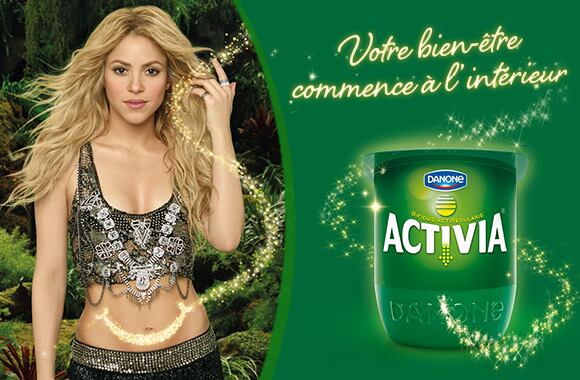Once powerful, go-to labelling like ‘good for joint health’ and ‘boosts immunity’ are now largely archived assets of the past. Records show that of 2,245 submissions, currently only 250 of these types of claims are granted authorisation.
However it may not be all doom and gloom. With brands forced to increase creativity to explore new communication territory in order to get their messages across, marketing departments and consumers might actually be better for it.
Danone/Pukka
For example having been denied any future use of the coveted ‘probiotic’ claim in the majority of European countries, Danone acted bravely in launching a new global comms strategy. Earlier this year the dairy-giant dropped all ties with the ‘probiotic’ name by opting instead to harness the power of a global celebrity - pop star Shakira – to build consumer-appeal in its biggest ever ad campaign rolled out across 55 markets.

Industry kudos were granted for the ‘out with the old, in with the new’ approach – particularly as this was balanced with maintaining efforts closer to the business heritage, including the prized Danone Institute initiative which links scientists involved in nutrition research with health and education professionals.
In contrast, Pukka premium herbal teas took the opportunity to reassess how to form better connections with customers around their ethical brand positioning. They realised that many were not aware of the company’s impressive sustainability credentials, including commitments to cultivate wild farmland across the world, creating habitats for wildlife and jobs for farmers along the way. To celebrate this, Pukka launched a new ‘charity tea’ to raise money for WWF (World Wildlife Foundation)-UK, giving them a new platform to tell this story, raise £50,0000 for WWF and create invaluable PR currency for the brand.
Others marketeers resourcefully saw ‘opportunities’ rather than ‘limitations’ in the regulation.
GSK / Lucozade
Last year, a daring comms idea by Lucozade Sport drink saw them take on the natural water industry with footballer Gareth Bale championing the slogan, “Lucozade Sport hydrates and fuels you better than water” via a £9m UK advertising campaign. The brazen initiative inevitably grabbed attention. The ads ran for over 12 months before the ASA could agree a position on whether the bold claim was permissible or not. Eventually, the campaign was banned with regulators deciding that the then-owned GSK brand had over-egged the authorised claim: “Carbohydrate-electrolyte solutions enhance the absorption of water during physical exercise”. Although contentious, the attempt showed initiative.
Industry worries
However, not all marketeers are as comfortable with losing their cherished health-related commercial words, terms and phrases that have undeniably been clearly understood by their consumers for many years.

A survey[i] conducted in-house at Pegasus indicated that a majority (66%) of food and nutrition companies are worried that they could be left with very little to say to customers if more health claims are rejected. In addition, despite 83% noting an increase in regulators pulling-up companies on contentious health messaging, 66% are still concerned that many competitors are not sticking to the same standards in complying with the regulation.
A further 83% of the companies surveyed recognised an increase in the value of earned mainstream media advocacy, particularly in communicating messages that support the health benefits of products, that would otherwise be hard to deliver via direct customer communications in the new regulatory framework.
Future prospects
So what next for marketing professionals in this new era of health-related communications?
Maybe the success of future communications around these products lies in a creativity shake-up to move on from over-reliance of familiar and predictable health-related messaging. However compelling, haven’t consumers heard that ‘omega-3s are good for you’all before?
Whether using health-related claims or not – marketeers and communicators still need to remember the ABCs of their trade. They need to remember that their job is to consider what they want their audiences to think, feel, do or change – and then create and deliver innovative ways to generate excitement and instil real connections.
Ultimately, it comes down to an individual decision and a point of view. Are household brands of tea, cereal, juices and supplements being placed in shopping baskets because customers have read a ‘high in antioxidants’ label? Or are repeat sales of these products grounded in something deeper – an element of loyalty, trust and connection based on these brands representing a part of who their customers are and/or want to be? Certainly, Mintel reports support the latter notion by reiterating that the nutrition market does not benefit from ‘impulse purchase’ in the same way as indulgent food or beauty sectors.
Let the brainstorms begin.
Marlon Bouman works with UK PR firm, Pegasus.
[i] Pegasus invited a small, select group of leading nutrition and health food organisations to provide thoughts and opinions on the impact of the Nutrition and Health Claims Regulation (NHCR). While most requested to remain anonymous, of the six contributors were FDD International, Viridian Nutrition, Natures Aid and Vitabiotics.
